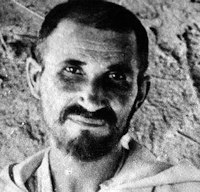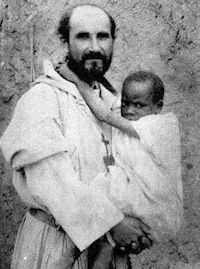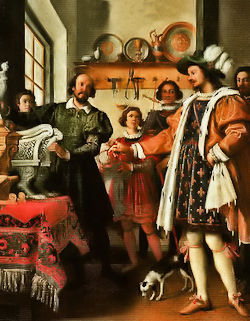Advent: December 1st
Tuesday of the First Week of Advent
Other Commemorations: St. Charles Eugène de Foucauld, Priest (RM); St. Eligius, Bishop (RM)
» Enjoy our Liturgical Seasons series of e-books!
Adam and Eve transmitted to their descendants human nature wounded by their own first sin and hence deprived of original holiness and justice; this deprivation is called "original sin". — 417 Catechism of the Catholic Church
The excellence of Adam and Eve's natural endowments.
 It is a deplorable error to extol as supernatural, perfections and powers that are entirely natural for us, even essential or integral to every human being. This includes our reason which is essential to our human nature, that without it no being can be really human. So also our spiritual will, with its power of loving things immaterial and purely spiritual, and its desire for the infinite and eternal, even with a longing that cannot find its perfect satisfaction except in the knowledge and love of Him who is for us our first Beginning and our last End. All this is so entirely natural for man, that a human soul is inconceivable without such spirituality and immortality.
It is a deplorable error to extol as supernatural, perfections and powers that are entirely natural for us, even essential or integral to every human being. This includes our reason which is essential to our human nature, that without it no being can be really human. So also our spiritual will, with its power of loving things immaterial and purely spiritual, and its desire for the infinite and eternal, even with a longing that cannot find its perfect satisfaction except in the knowledge and love of Him who is for us our first Beginning and our last End. All this is so entirely natural for man, that a human soul is inconceivable without such spirituality and immortality.
The preciousness of Adam and Eve's preternatural gifts.
God not only gave Adam and Eve dominion over the whole world, but He actually brought human nature in them to an extraordinary degree of perfection, such as would assure both to themselves and to their offspring, for all the time of their life in paradise, freedom from every fear of sickness and death, and from all sorrow and all worrying care and every annoying disorder. And without passing through the gateway of death, they would in God's own time be assumed by Him into their eternal home, the true paradise of their destiny.
The wonders of Adam and Eve's supernatural destiny and state.
God created our first parents into an inexpressibly high and strictly supernatural and divine, order. He created them for the final perfection and eternal happiness of living in close association with Himself as His very children, in the face-to-face vision of Himself as He is in Himself, and in a most intimate communing with Him and a filial sharing in the wealth and sweetness of the bliss of the Most Holy Trinity. In the first moment of their existence, by the infusion of His sanctifying grace, God adopted them as His very children.
Things to Do:
- Don't forget to pray "Hail and Blessed be the hour..., the Christmas Anticipatory Prayer every day until Christmas.
- St. Nicholas Day is coming soon. Take time today to plan some activities, foods and little surprises for the shoes or stockings left out on St. Nicholas Eve (December 5). See the activities and recipes on St. Nicholas Day for ideas.
- Think of others who aren't as privileged who will be suffering from loneliness, depression, sickness, poverty, etc. during these Advent and Christmas seasons. Make sure your Advent preparation includes some Corporal Works of Mercy for others. Perhaps make an extra batch of St. Nicholas cookies and distribute them to the homeless or the nursing home.
St. Charles de Foucauld (Brother Charles of Jesus)
 Saint Charles de Foucauld was born in Strasbourg, France on September 15th, 1858. Orphaned at the age of six, he and his sister Marie were raised by their grandfather in whose footsteps he followed by taking up a military career.
Saint Charles de Foucauld was born in Strasbourg, France on September 15th, 1858. Orphaned at the age of six, he and his sister Marie were raised by their grandfather in whose footsteps he followed by taking up a military career.
He lost his faith as an adolescent. His taste for easy living was well known to all and yet he showed that he could be strong willed and constant in difficult situations. He undertook a risky exploration of Morocco (1883-1884). Seeing the way Muslims expressed their faith questioned him and he began repeating, “My God, if you exist, let me come to know you.”
On his return to France, the warm, respectful welcome he received from his deeply Christian family made him continue his search. Under the guidance of Fr. Huvelin he rediscovered God in October 1886. He was then 28 years old. “As soon as I believed in God, I understood that I could not do otherwise than to live for him alone.”
 A pilgrimage to the Holy Land revealed his vocation to him: to follow Jesus in his life at Nazareth. He spent 7 years as a Trappist, first in France and then at Akbès in Syria. Later he began to lead a life of prayer and adoration, alone, near a convent of Poor Clares in Nazareth.
A pilgrimage to the Holy Land revealed his vocation to him: to follow Jesus in his life at Nazareth. He spent 7 years as a Trappist, first in France and then at Akbès in Syria. Later he began to lead a life of prayer and adoration, alone, near a convent of Poor Clares in Nazareth.
Ordained a priest at 43 (1901) he left for the Sahara, living at first in Beni Abbès and later at Tamanrasset among the Tuaregs of the Hoggar. He wanted to be among those who were, “the furthest removed, the most abandoned.” He wanted all who drew close to him to find in him a brother, “a universal brother.” In a great respect for the culture and faith of those among whom he lived, his desire was to “shout the Gospel with his life”. “I would like to be sufficiently good that people would say, “If such is the servant, what must the Master be like?”
On the evening of December 1, 1916, he was killed by a band of marauders who had encircled his house.
He had always dreamed of sharing his vocation with others: after having written several rules for religious life, he came to the conclusion that this “life of Nazareth” could be led by all. Today the “spiritual family of Charles de Foucauld” encompasses several associations of the faithful, religious communities and secular institutes for both lay people and priests.
—Excerpted from the Libreria Editrice Vaticana
Highlights and Things To Do:
- See the website dedicated to St. Charles.
- Read more about St. Charles:
- Here are some quotes by Charles de Foucauld at Jesus Caritas and a picture biography.
- Another excellent biography of Charles de Foucauld which can be downloaded as a pdf file.
- Some short biographies from the Dictionary of African Christian Biography.
St. Eligius
 Eligius, a goldsmith at Paris, was commissioned by King Clotaire to make a throne. With the gold and precious stones given him he made two. Struck by his rare honesty, the king gave him an appointment at court, and demanded an oath of fidelity sworn upon holy relics; but Eligius prayed with tears to be excused, for fear of failing in reverence to the relics of the Saints.
Eligius, a goldsmith at Paris, was commissioned by King Clotaire to make a throne. With the gold and precious stones given him he made two. Struck by his rare honesty, the king gave him an appointment at court, and demanded an oath of fidelity sworn upon holy relics; but Eligius prayed with tears to be excused, for fear of failing in reverence to the relics of the Saints.
On entering the court he fortified himself against its seductions by many austerities and continual ejaculatory prayers. He had a marvellous zeal for the redemption of captives, and for their deliverance would sell his jewels, his food, his clothes, and his very shoes, once by his prayers breaking their chains and opening their prisons. His great delight was in making rich shrines for relics.
His striking virtue caused him, a layman and a goldsmith, to be made Bishop of Noyon, and his sanctity in this holy office was remarkable.
He possessed the gifts of miracles and prophecy, and died in 665.
—Excerpted from Lives of the Saints, by Alban Butler, Benziger Bros. ed. [1894]
Patronage: against boils; against epidemics; against equine diseases; against poverty; against ulcers; agricultural workers; basket makers; blacksmiths; boilermakers; cab drivers; candle makers; carpenters; carriage makers; cartwrights; clock makers; coachmen; computer scientists; craftsmen; cutlers; electricians; engravers; farmers; farriers; gilders; goldsmiths; guards; gunsmiths; harness makers; horse traders; jewelers; jockeys; knife makers; laborers; lamp makers; livestock; locksmiths; mechanics; metalsmiths; miners; minters; numismatics; Royal Electrical and Mechanical Engineers; saddle makers; scissors grinders; security guards; servants; silversmiths; tinsmiths; tool makers; veterinarians; watch makers; wheelwrights; Worshipful Company of Blacksmiths; coin collectors; garages; gas stations; horses; livestock; metal collectors; numismatists; peasants; petrol stations; precious metal collectors; sick horses; Eloois-Vijve, Belgium; Sint-Eloois-Winkel, Belgium; Carrozzieri, Italy; Schinveld, Netherlands (from CatholicSaints.info)
Symbols and Represented As: anvil; hammer; horseshoe; pincers
bishop with a crosier and miniature church of chased gold; bishop with a hammer, anvil, and horseshoe; bishop with a horse; courtier; goldsmith; man grasping a devil‘s nose with pincers; man holding a chalice and goldsmith‘s hammer; man holding a horse‘s leg, which he detached from the horse in order to shoe it more easily; man shoeing a horse; man with hammer and crown near a smithy; man with hammer, anvil, and Saint Anthony; with Saint Godebertha of Noyon; giving a ring to Saint Godebertha (from CatholicSaints.info)
Highlights and Things To Do:
- Read more on St. Eligius:
- St. Eligius' remains are in the Noyon cathedral.
- Geometry plays a role in today's feast day. "Recent studies regarding Fractal patterns and French Gothic Cathedrals constructed from the 12th to 15th century proved new understanding in the design of these Cathedrals. It was determined that not only did Noyon Cathedral and others follow Euclidean Geometry, but also Fractal Geometry and Fractal Dimensions." See The Fractal Pattern of the French Gothic Cathedrals.








